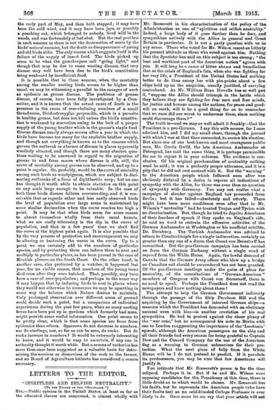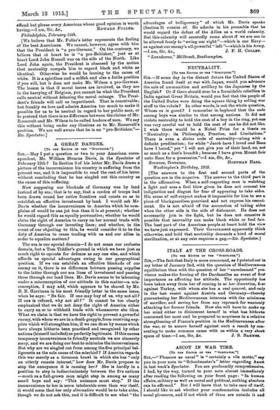LETTERS TO THE EDITOR.
"SPIRITLESS AND SELFISH NEUTRALITY." [To rm. rmaa ens. "Brecmon.”) Sta.—Public opinion in the United States, at least so far as the educated classes are concerned, is almost wholly with
Mr. Roosevelt in his characterization of the policy of the Administration as one of "spiritless and selfish neutrality." Indeed, a large body of it goes further than he does, and sympathizes actively with the Allies iu general and Great Britain in particular. It is not a party question with us in any sense. Those who voted for Mr. Wilson resent as bitterly his present attitude as those who voted against him. Nothing that the Spectator has said on this subject is too strong; "the best and worthiest part of the American nation" agrees with you. It will long be a cause of bitter shame and humiliation that at the crisis of England's fate, when she was fighting for her very life, a President of the United States had nothing better to do than annoy her with pin-pricks about a few ships held up on the satpicion, usually justified, of carrying contraband. As Idr. William Dean Howells has so well put it, " suppose the Allies ahotdd triumph in the battle which they believe they are fighting for free men and free minds, for justice and honour among the nations, for peaoe and good- will on earth, will it be a good thing for us to remember that we once did our worst to withering, them, since nothing weld discourage them P" The truth is—and we may as well admit it frankly—that the President is a pro-German. I say this with sorrow, for Ione*, admired him, and I did my small share, through the journal with which I was at that time connected, to secure his election. But since one of our best-known and most courageous public men, Mr. Curtis Guild, the late American Ambassador at Petrograd, has said the same thing, it is perhaps permissible for me to repeat it in your columns. The evidence is con- clusive. Of his original proclamation of neutrality nothing need be said; it was a perfectly proper utterance, and it is a pity that he did not rest content with it, But the "warning" to the American people which followed soon after was obviously dictated by a desire to repress all indications of sympathy with the Allies, for there was even then no question of sympathy with Germany. You may not realise what a campaign of slander against England has proceeded from Berlin; but it has failed—absolutely and utterly. There might have been more confidence even after that in Mr. Wilson's " neutrality " had he treated Trojan and Tyrian with no discrimination. But, though he tried to deprive Americans of their freedom of speech if they spoke on England's side, he said no word to restrain the offensive activities of the German Ambassador at Washington or his unoffieial satellite, Dr. Dernbarg. The Turkish Ambassador was advised to return to Constantinople for n single indiscretion, certainly no greater than any one of a dozen that Count von Bernatorff has committed. But the pro-German campaign has been carried on from the German Embassy without a single word of reproof from the White House. Again, the lawful demand of Canada that the German Army officer who blew up a bridge on Canadian soil should be surrendered has not been granted. Of the pro-German meetings under the guise of pleas for neutrality, of the consultations of "German-American" members of Congress with Count von Bernstorff, there is no need to speak. Perhaps the President does not read the newspapers and knew nothing about. them The attempt to help the German Government indirectly through the passage of the Ship Purchase Bill and the acquiring by the Government of interned German ships—a measure which the President has demanded with an obstinacy unusual even with him—is another revelation of his real sympathies. He had to protest agailla the sheer piracy of the " war zone," but he accompanied his note to Berlin with one to London exaggerating the importance of the "Lusitania' episode, although the American passengers on the ship and all their friends had every mason for being grateful to Captain Dow and the Cmiard Company for the use of the American Bag as a warning to German submarines for their pro- tection. What the next piece of folly from the White House will he I do not pretend to predict. If it parallels its predecessors, you may be sure that few Americans will justify it.
You intimate that Mr. Roosevelt's power is for the time eclipsed. Perhaps it is. But if he and Mr. Wilson weni opposing candidates for the Presidency at this time, there is little doubt as to which would be chosen. Mr. Rooserelt has his faults, but he represents the American people (who have their faults too) as no cold-blooded College Professor is ever likely to do. Once more let me say that your article will net Offend but please every American whose good opinion is worth [We believe that Mr. Fuller's letter represents the feeling of the best Americana. We cannot, however, agree with him that the President is "a pro-German." On the contrary, we believe that at heart he is "a pro-Britisher," just as at heart Lord John Russell was on the side of the North. Like Lord John again, the President is obsessed by the notion that neutrality compels him to regard black and white as identical. Otherwise he would be leaning to the cause of white. It is a spiritless and a selfish and also a futile position if you will, but it does not make Mr. Wilson a pro-German. The lesson is that if moral issues are involved, as they are in the harrying of Belgium, you cannot be what the President calls neutral without debasing the moral coinage. The Presi- dent's friends will call us impertinent. That is conceivable; but frankly we love and admire America too much to make it possible for us to be neutral in regard to her public men, or to pretend that there is no difference between the claims of Mr. Roosevelt and Mr. Wilson to be called leaders of men. We say this without being under any illusions as to Mr. Roosevelt's position. We are well aware that he is no " pro-Britisher."— ED. Spectator.]



































 Previous page
Previous page